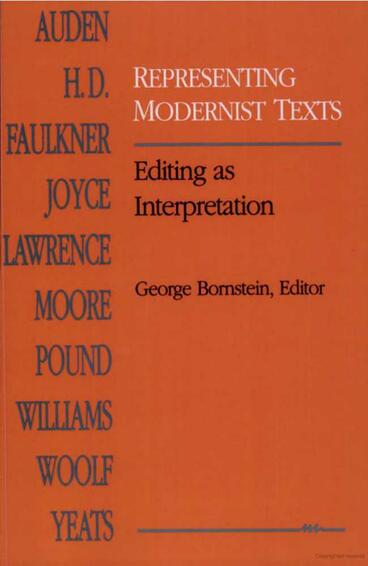Representing Modernist Texts
Editing as Interpretation
Literary scholars explore the significant yet largely ignored field of textual and editorial scholarship in the work of modern authors
Description
Representing Modernist Texts seeks to expose, and then to bridge, the gap between contemporary textual scholarship and the critical and theoretical study of modernist texts. Modernist critics and scholars have for too long consigned textual problems to work from earlier periods and largely ignored them in creating successive waves of avantgarde critical theory designed first to champion, and more recently to challenge, modernist literature itself. And yet, as the controversy around Hans Walter Gabler’s edition of Ulysses has made clear, twentieth-century texts are deeply problematic at the physical as well as the interpretive level.
In Representing Modernist Texts, thirteen internationally known scholars provide major explorations of the topic in the work of particular writers. The issues they raise include the construction of a writer’s canon and the effect of newly available “uncanonical” manuscript materials on existing works and orderings; the replacement of the older idea of a fixed, stable text by a more contemporary notion of the text as process; and the interrogation by advanced textual theory of many of the same notions of “author,” “intention,” and “stability of the text” questioned by advanced literary theory.
Reviews
"This well-written collection of essays makes a strong argument that ore dialogue between modern theoretical inquiry and the practice of textual editing is needed."
- English Language Notes
--English Language Notes
"Perhaps the most meaningful contribution of Representing Modernist Texts is its formal initiation of an exciting new dialogue that promises to help readers reevaluate how they see modernist texts and to reconsider the relationship between textual criticism and theory. . . . [T]his valuable text will be of great interest to students of modernist literature. It should be essential reading for all textual critics and theorists who are open to rethinking their own procedures."
- Modern Philology
--Modern Philology
"The focus on particular writers makes this an important collection of critical essays on modernism, not merely a casebook on narrow editorial problems. . . . In short it all adds up to the most persuasive case for, or invitation to, a greater rapprochement between editors and critics."
- Sewanee Review
--Sewanee Review
". . . [a] fascinating collection of articles exploring the complexities of editing modernist literary works."
- Woolf Studies Annual
--Woolf Studies Annual

